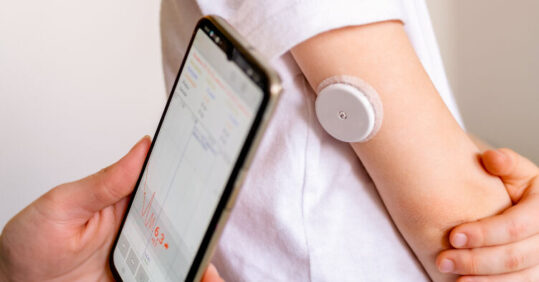Primary care nurses must be supported to utilise data in treating diabetes, says specialist

Nurses working across primary care must be supported and trained to fully utilise diabetes technology, especially amid an increase in demand and complexity of diabetes cases, a specialist in the field has told.
Charlotte Gordon, Royal College of Nursing (RCN) diabetes forum chair and assistant professor of adult nursing at Northumbria University, has spoken exclusively to Nursing in Practice about the importance of data and technology to support personalised care for those with diabetes.
According to Ms Gordon, primary care was the ‘next bastion for diabetes technology’, but she stressed it was vital that primary care nurses had the right support to develop the ‘digital skills’ required.
‘It requires a strategy, and as an academic I’m keen that there is more focus around technology across the nursing curriculums,’ Ms Gordon added.
Related Article: NHS 10-year plan: What does it mean for nursing?
She recognised the ‘increase in work’ for primary care nurses and suggested this was ‘coming from the increased incidence and possibly increased complexity’ of diabetes cases.
‘So, now you’ve got someone with an elevated HbA1c [average blood glucose level] who typically might have been referred onto the specialist centre, who is now getting managed in primary care,’ she said.
In recent weeks, Diabetes UK revealed that the number of people living with diabetes in the UK had exceeded five million.
But amid the increase in demand, Ms Gordon suggested that ‘if we work strategically and utilise data, different work streams, and smart ways of working, then there is a potential to stratify need’.
For example, she described a situation in which nurses could assess the HbA1c levels of patients wearing a remote blood glucose monitoring device and make a decision on whether that patient needed to be called for an appointment.
‘It’s about that personalised approach, utilising data to streamline what we’re doing, and not just habitually recalling people because it’s time to,’ she told Nursing in Practice.
Related Article: Funded nurse workforce plan needed for neighbourhood health services
She added that ‘data is really important because it provides the opportunity to do tailored patient care’.
A report by the Queen’s Nursing Institute entitled ‘Nursing in the digital age’ recently found that digital solutions sometimes caused workload issues and were hampered by poor connectivity and interoperability for nurses working the community.
However, Ms Gordon believes that the pandemic has accelerated the transition towards digital solutions and that, with support, nurses can make the most of data.
‘It is about showing that this technology is not just for the sake of technology, but that it will improve their workflow,’ she said.
Related Article: Over one million children living in homes causing asthma and chronic illness
‘But if it just makes everything harder, then it is not something that people are going to engage with.
‘We can’t assume that nurses will pick it up and run with it, there needs to be support in one form or another.’

See how our symptom tool can help you make better sense of patient presentations
Click here to search a symptom




